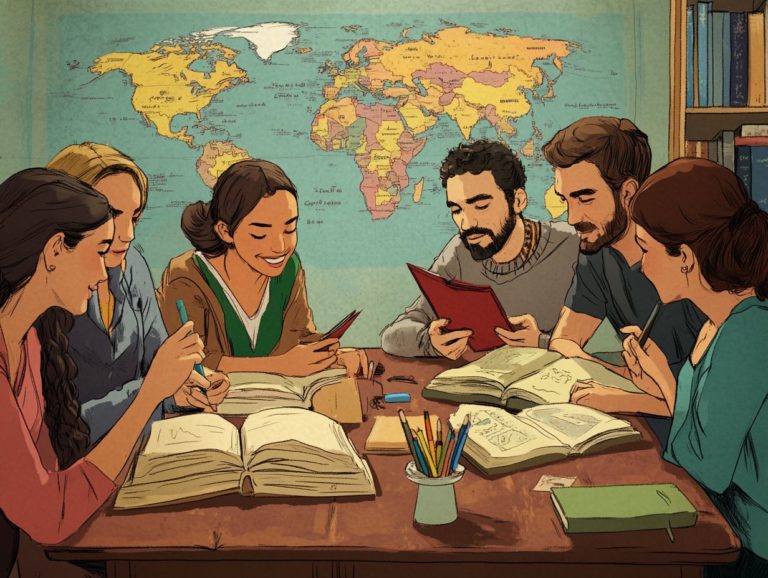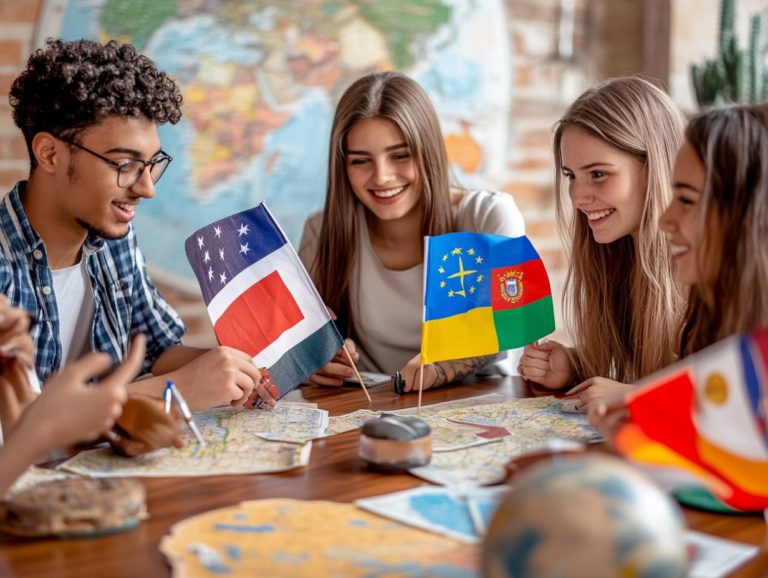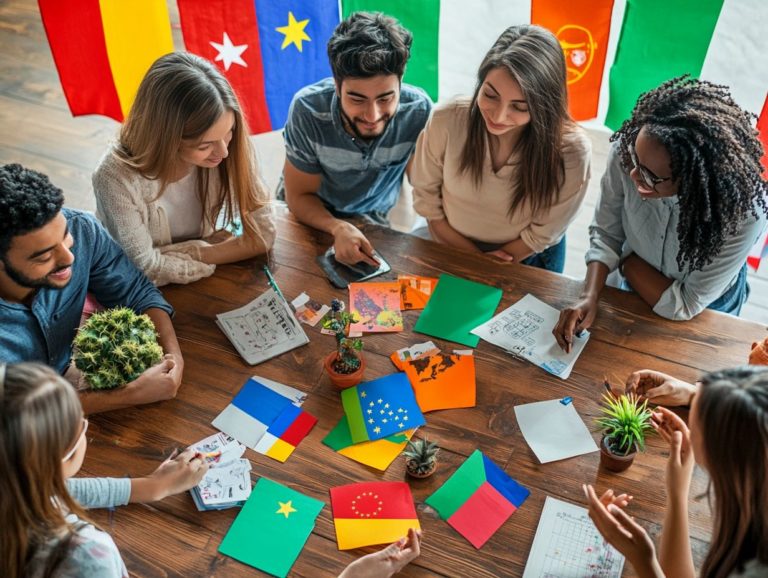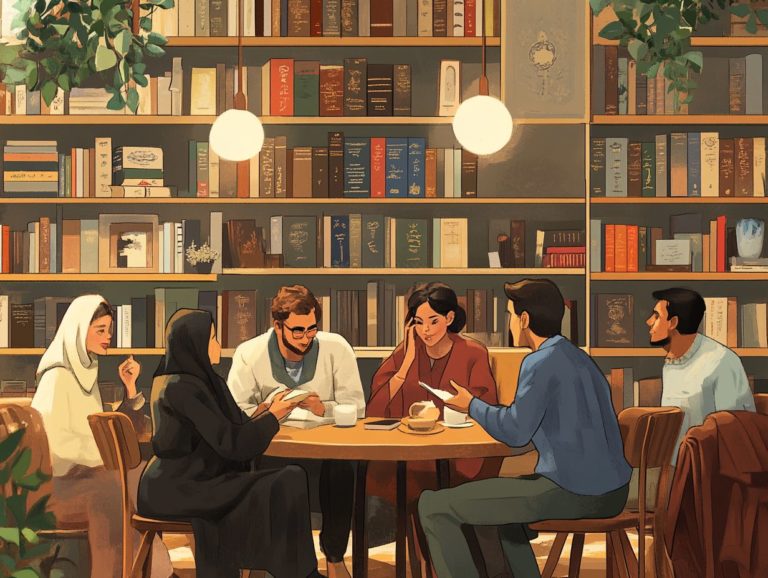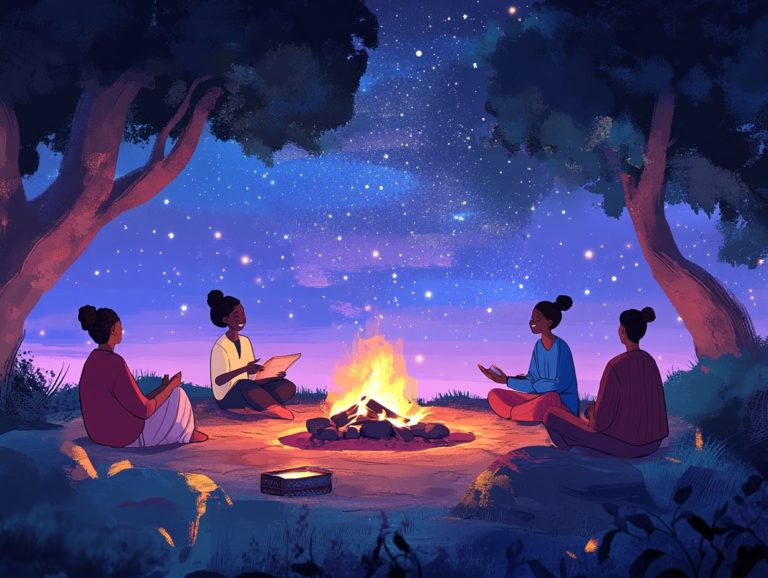the power of storytelling in language and culture
Storytelling is more than just entertainment. It connects language and culture, bringing people together across generations.
It plays a vital role in building human connections, preserving traditions, and enhancing our understanding of the world.
Every word you choose shapes your beliefs and influences your perspective.
Discover how storytelling bridges cultural divides. It can transform your language learning experience in unexpected ways.
Contents
- Key Takeaways:
- The Importance of Storytelling in Language and Culture
- The Role of Storytelling in Preserving Culture
- The Power of Language in Storytelling
- How Storytelling Shapes Our Perception of the World
- Using Storytelling to Bridge Cultural Divides
- Incorporating Storytelling into Language Learning
- Frequently Asked Questions
- What is the significance of storytelling in language and culture?
- How does storytelling impact language?
- What makes storytelling a powerful medium for cultural exchange?
- How has the power of storytelling been used in history?
- Can storytelling be used for social change and activism?
- How can we harness the power of storytelling in our daily lives?
Key Takeaways:
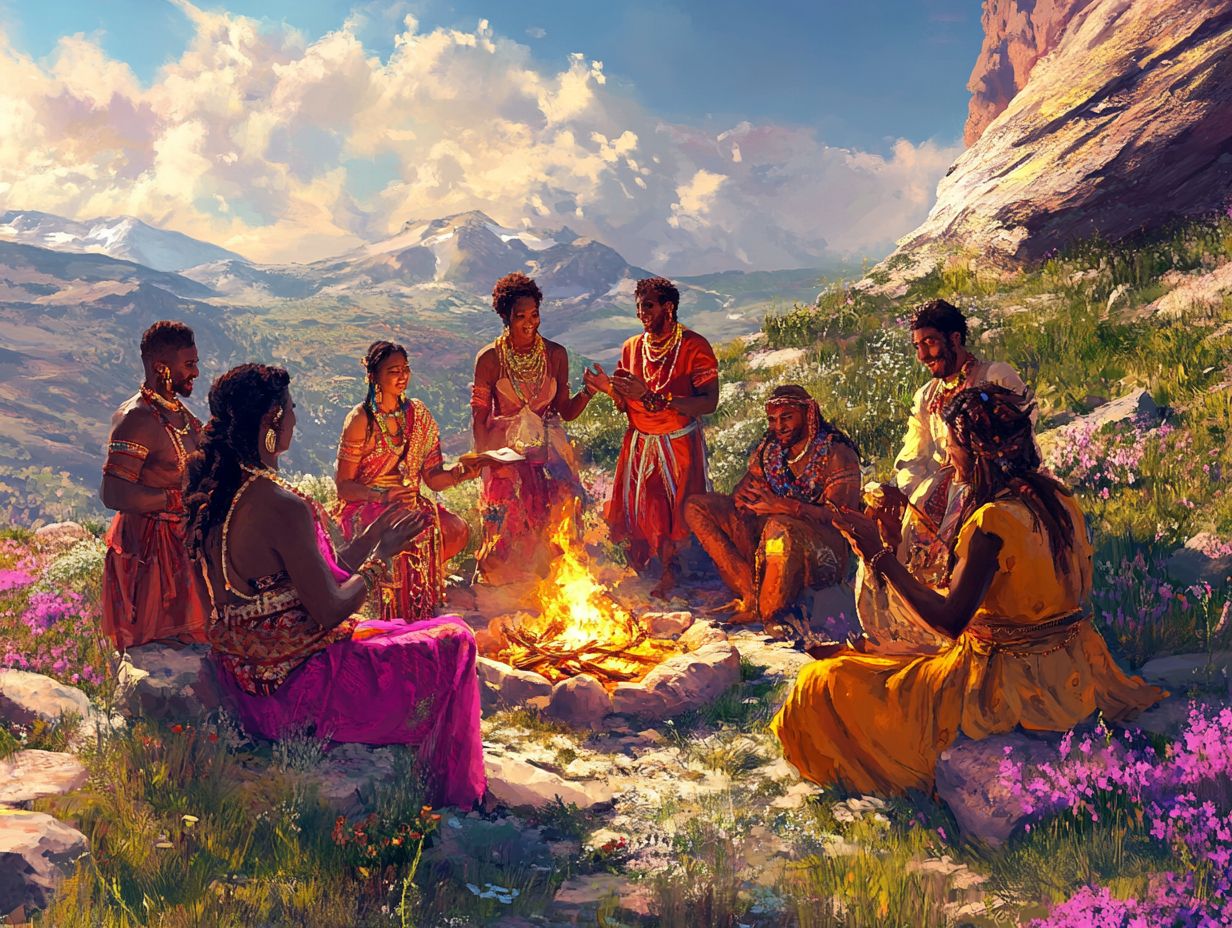
Stories are essential for connection, helping us share experiences and understand one another. They preserve culture by passing down traditions and values through generations.
The Importance of Storytelling in Language and Culture
Storytelling connects the past with the present. Through stories, you shape your identity and values.
Consider director Alfonso Cuar n’s film ‘Roma’. It intertwines personal experiences with cultural themes, showcasing the art of narrative storytelling.
Classic tales like ‘Tom Sawyer’ use symbols to reveal deeper truths. In contrast, Gabriel Garc a M rquez’s ‘100 Years of Solitude’ shows how stories shape society’s views.
By exploring storytelling’s anthropological aspects, you’ll see its role in preserving heritage and fostering connections.
Why Stories are Essential for Human Connection
Stories are fundamental for fostering human connection. They offer relatable experiences that resonate across diverse cultures.
These stories invite you to step into others’ shoes, evoking empathy through shared struggles and triumphs. Engaging with a character’s journey, like in Joseph Campbell’s hero’s journey, helps you find reflections of your life in the tale.
This universal framework highlights common themes of courage and growth. It also works to break down barriers.
As you connect with these timeless stories, you cultivate a deeper understanding of others. This nurtures relationships built on compassion and trust.
The Role of Storytelling in Preserving Culture
Storytelling is vital in the fabric of culture. It captures shared histories, beliefs, and values that shape communities.
By weaving stories, you preserve the essence of your heritage. This ensures that your collective experiences continue to inspire.
How Stories Pass Down Traditions and Values
Through storytelling, you pass down traditions and values across generations. This ensures your cultural identity remains strong.
For instance, many Indigenous cultures use oral traditions as living histories. Elders narrate legends infused with morals that emphasize the importance of nature and community.
Similarly, literature plays a crucial role; classic novels or children’s stories instill a sense of belonging in young readers. They also provide insights into the values of their ancestors.
Both mediums foster a deeper understanding of your cultural heritage. They remind you of your roots and responsibilities within your community.
The Power of Language in Storytelling
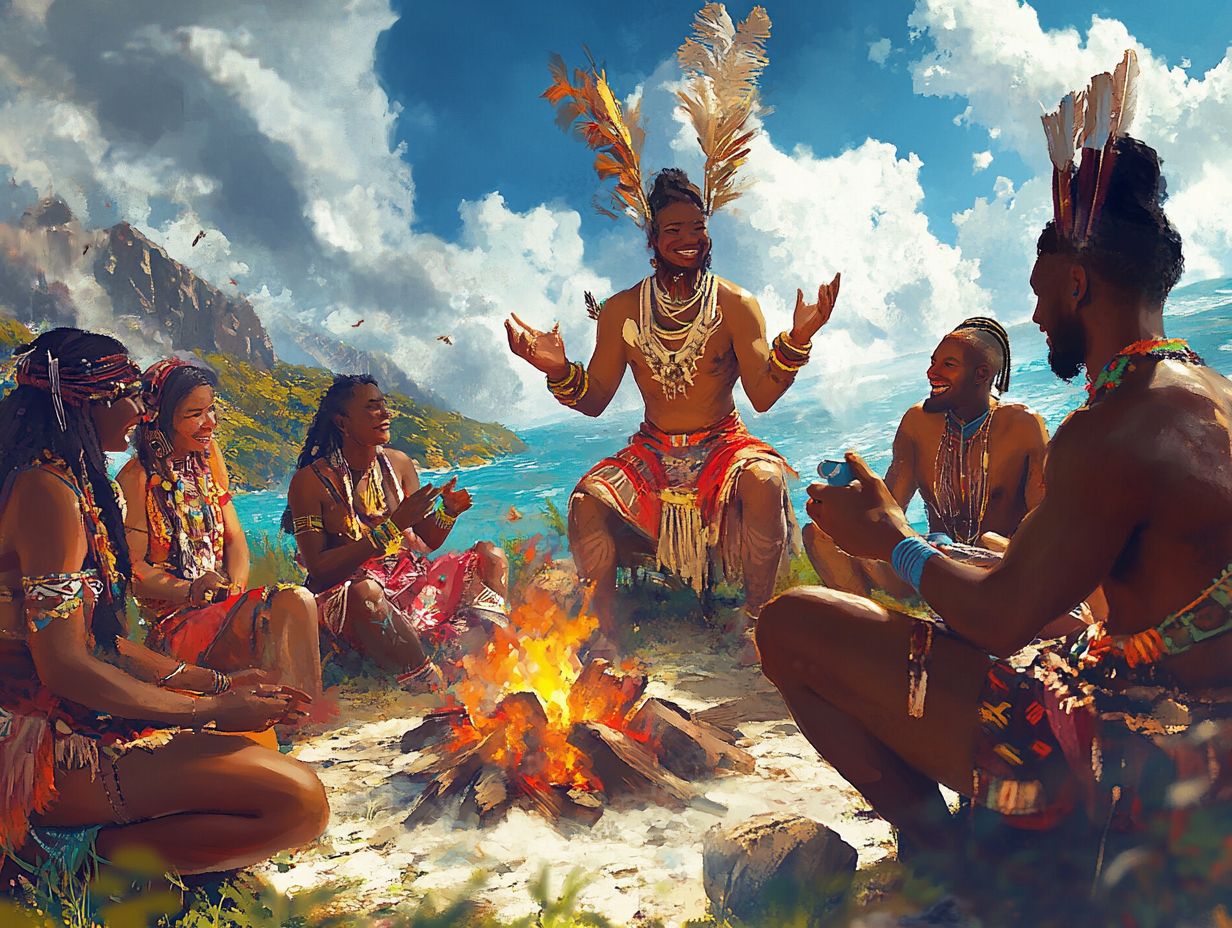
Language forms the foundation of storytelling. It evokes emotions, conveys meaning, and unites diverse audiences through shared narratives.
The Influence of Words and Phrases
The words and phrases you choose in storytelling can profoundly shape the emotional resonance and impact of your narrative. Often, metaphors are utilized to deepen understanding.
These techniques allow you to draw connections not only between events but also between your audience’s own experiences and cultural touchstones. By weaving in imagery that resonates with universal human emotions, your narratives become relatable. This invites listeners or readers to embark on a shared journey.
For instance, when you describe a challenging moment as “going through tough times,” you vividly portray struggle and resilience, making abstract feelings tangible. These linguistic elements enhance your tale and create a vivid landscape where your audience can immerse themselves. This blurs the lines between fiction and personal experience.
How Storytelling Shapes Our Perception of the World
Storytelling profoundly shapes your perception of the world. It influences your beliefs and perspectives.
Ultimately, it guides how you interpret the myriad experiences that life presents to you.
Impact on Beliefs and Perspectives
The impact of storytelling on your beliefs and perspectives is nothing short of profound. It shapes the way you understand and relate to the world around you.
In communities worldwide, narratives act as vessels for cultural transmission. They foster empathy and challenge long-held biases.
Consider literature like Harper Lee’s “To Kill a Mockingbird,” which prompts you to confront issues of racial injustice. Films like “The Pursuit of Happyness” resonate deeply, illustrating themes of perseverance and hope.
These stories entertain and also influence societal perceptions. They spark discussions around complex issues. As you engage with these narratives, you may find yourself reassessing your own views, leading to transformative shifts in beliefs and a greater understanding of diverse experiences.
Using Storytelling to Bridge Cultural Divides
Storytelling acts as a potent instrument for bridging cultural divides. It cultivates empathy and fosters mutual understanding among diverse groups.
Through the art of storytelling, you can connect with others on a deeper level. This transcends barriers and enriches the tapestry of shared human experience.
Breaking Down Barriers and Building Empathy

Storytelling breaks down barriers and sparks empathy. It enables you to connect on a deeper level through shared narratives and experiences.
Consider how indigenous elders share tales of their ancestral lands and traditions. They construct a bridge for listeners unfamiliar with those cultures, offering a vivid glimpse into lives shaped by rich histories and distinct values.
In community workshops, narratives stemming from diverse backgrounds can foster understanding among participants from different socio-economic situations. This sparks discussions that rise above superficial differences.
The emotional resonance of these stories often leads to transformative moments of vulnerability. Here, you may discover common ground and reflect on your own experiences.
This process enhances both your ability to adapt your thinking to new situations and your emotional intelligence as you navigate the intricate landscape of a multicultural world.
Incorporating Storytelling into Language Learning
Incorporating storytelling into your language learning journey not only deepens your cultural understanding but also brings a wealth of cognitive benefits.
Engaging with narratives enriches your experience, making the process more immersive and meaningful.
Join the movement use storytelling to create change and bridge gaps!
Benefits for Language Acquisition and Cultural Understanding
The benefits of storytelling in language acquisition are remarkable. It enhances your language skills and helps you understand diverse cultures.
These techniques help you understand stories as you engage with characters and plots. You can remember new vocabulary better through relatable stories.
Storytelling also offers cross-cultural insights. It helps you appreciate the customs and values illustrated in these narratives.
Educational practices that include storytelling like role-playing based on books or animated storytelling sessions immerse you in the language. This creates a dynamic environment that encourages active participation.
Frequently Asked Questions
What is the significance of storytelling in language and culture?
Storytelling plays a crucial role in preserving cultural traditions, values, and beliefs. It’s a powerful way to shape and maintain a community’s identity.
How does storytelling impact language?

Stories are key to language learning. They allow you to engage with language meaningfully and understand its nuances.
What makes storytelling a powerful medium for cultural exchange?
Storytelling breaks down language barriers. It connects people from different cultures, promoting empathy and understanding.
How has the power of storytelling been used in history?
Throughout history, storytelling has preserved cultural traditions and spread ideologies. It has passed down knowledge and united communities in tough times.
Yes, storytelling promotes social change. Personal stories can raise awareness and inspire action toward positive change.
How can we harness the power of storytelling in our daily lives?
Start incorporating storytelling into your daily life today! Share personal stories with friends, explore tales from different cultures, and use storytelling for learning.
By doing so, you’ll strengthen your language skills, increase cultural awareness, and build deeper connections with others.

